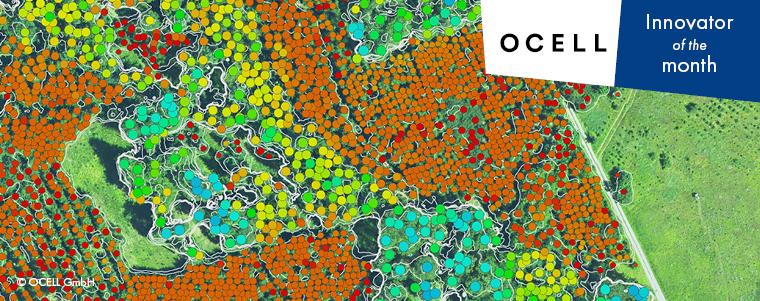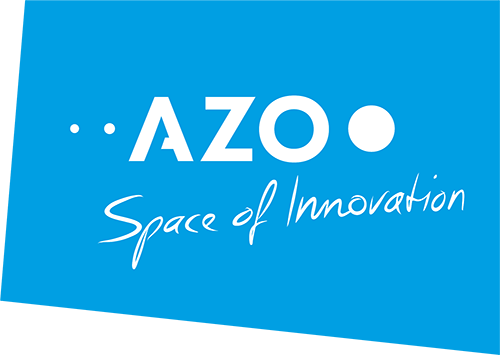Determining and maintaining the health of a forest or agricultural land is a costly and time-consuming process, as current methods mostly require manual sample control tours.
This is where ESA BIC Bavaria start-up OCELL’s solution comes in. OCELL combines extremely high-resolution imagery, precise georeferencing and machine learning tools to collect and analyse geospatial data. Customers from the forestry and agricultural industry are provided with a broad understanding of the forest’s characteristics, for example tree classification, as well as the vegetation’s up-to-date health status. This enables forest managers to significantly reduce their running costs for forest stocktaking and fertiliser applications. Besides forest managers, OCELL’s services also impress infrastructure providers. The company was recently announced as one of this year’s INNOspace Masters DB Netz AG Challenge winners, where its technology is applied to observe vegetation along critical infrastructure, especially to predict falling trees.
OCELL was initiated by the three co-founders David Dohmen, Christian Decher and Felix Horvat and has been an ESA BIC Bavaria Incubatee since 2019.
Pia Feurstein, ESA BIC Bavaria Junior Project Manager at AZO, interviews David Dohmen (DD), Managing Director of OCELL.
PF: Please give us a sneak peek of your product and the team behind it.
DD: OCELL digitises processes in forest management by leveraging aerial imagery and artificial intelligence. Using our highly specialised camera hardware with highly efficient ultralight aeroplanes allows us to acquire the highest quality data at scale. Our analytics allow in-depth insights into forest status, health, statistics and even predictions – making the lives of forest managers easier by saving them time and giving them a more accurate data foundation for decision-making.
PF: What has been your company’s biggest challenge so far?
DD: Like most start-ups, the search for a perfect product-market fit is the Holy Grail and never easy. Furthermore, financing the development of so many layers of deep tech is a constant challenge but has also taught us to always think in terms of efficiency.
PF: Can you explain the three main ingredients of your recipe for success?
DD: Firstly, talking to your (potential) customers before getting down to building things. This seems to be an extremely common mistake, especially among engineers, and we’ve really had to force ourselves not to fall into the trap of “blindly engineering” in the past. We’ve seen over and over again how incredibly valuable discipline is in this regard.
Another important ingredient is keeping a clear head and making rational decisions instead of following the hype without questioning it. This ‘thinking outside the box’ has prevented us from being caught in numerous traps and dead ends. Lastly, we value healthy debates and questioning everything we do – this obviously applies to everyone from founder to intern.
PF: Did the recent Covid-19 outbreak have any effects on your business and/or are you expecting any impacts in the future?
DD: We weren’t able to make data acquisitions for a short while because airports had closed down but, other than that, business has been great. Forests always need tending – regardless of crises. However, we expect VC funding has become harder since the beginning of the crisis. We’re keen on finding out in the upcoming months!
PF: What do you expect from ESA BIC Bavaria and how do you think the initiative and its network will help you to kick-start your business case?
DD: We see ESA BIC Bavaria as a very helpful network. Being part of this community brought invaluable contacts, entertaining and informative sessions, and useful feedback and analyses of our business model. Last but not least, the financial support has a large impact on our capability to develop our technology.
PF: What do you think to benefit from the DLR support?
DD: DLR has incredible expertise in all flight related topics from technology and operations to regulatory issues. We’re convinced we can benefit a lot from this deep knowledge base and are happy to have direct access to experts.
PF: Let’s reach for the stars – what is going to happen in OCELL’s future?
DD: The whole economic sector of forestry will become more visible and important, considering its tremendous importance for our society and climate. We see ourselves as a crucial part in saving and improving the benefits of this ecosystem, while also easing the economic hardship forest management is often facing today. The need to digitise this sector is obvious and we intend to become the best and most holistic solution for forest management in the world.
Want to find out more about OCELL? Get in contact with the founders via e-mail. Stay tuned for upcoming interviews with more ESA BIC Bavaria innovators on our AZO Blog.





Comments are closed.